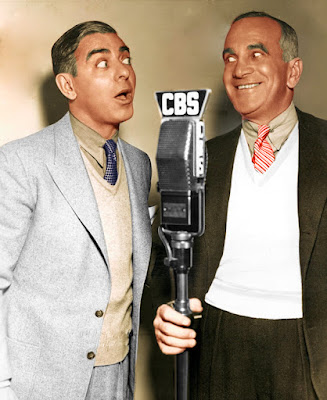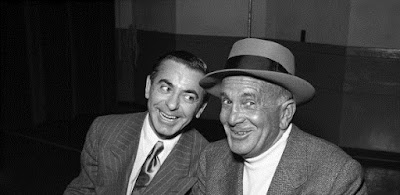This great rememberance of Al Jolson was written by his long time friend Eddie Cantor. It was published shortly after Jolson's death on this day - October 23rd in 1950...
The attendants and technicians at the studio were all red-eyed from weeping. None of these people had ever met Al Jolson personally. Yet, because Jolie was a man of the people, because he seemed to know and love everyone who had ever heard the sound of his voice, the grief over his passing was universal.
Jolie had human frailties, just as any other man. I say this in all sincerity and with my heart full of love for the man we all knew as “The King.” Jolie’s great heart, his wonderful, almost child-like spirit, and his overflowing love of humanity overshadowed everything else.
He never forgot his nearness to the people and his nearness to his God. Those of us who kidded him the most loved him the most. Whenever the gang – Jack Benny, George Jessel, George Burns and Jolie – used to gather at my house, there was never a night when we didn’t get together to sing “Mammy.” But there was never anybody who could sing “Mammy” like Jolson could.
We all looked upon him with envy because we could never hope to reach his stature, but he was also an inspiration to all his contemporaries. He was six acts of top billing rolled into one and for anyone to compete with him was like watching a midget in a sideshow trying to touch the giant’s head. To call him the biggest hunk of entertainer in show business was an understatement. He was the only entertainer who was his own lighting and his own scenery.
Jolie always loved to play jokes and get ‘em to laugh. I remember one time when I was playing opposite him in Chicago. We both lived in the Belmont Hotel in Chicago’s North Side and we used to meet after our shows and kid each other and lie to one another about the take at the box-office that night. We spent hours with each other every night for five months and I never had so much fun in all my life. The newspapers kept trying to cook up a phony feud between us but neither one of us took it seriously.
Then one day, I came down with pleurisy and my doctor advised me to close my show and take a rest.
“I can’t, Doc,” I told him. “Then all the newspapers will say, ‘Jolson drives Cantor out of town!’ ”
Sick as I was, I kept on going night after night. But then finally, I got so weak I couldn’t even walk out on the stage and so I closed the show and left for New York. Imagine my amazement when I got off the train, picked up the New York Times and read this headline on the theatrical page: “Jolson closes his show immediately after Cantor closes his show!” It turned out that Jolie had been sicker than I was, but he’d kept going only because he didn’t want the newspapers to say: “Cantor drives Jolson out of town!”
Jolie brought joy to more people than any other man alive. He was more than an actor or a singer or an entertainer – he was an experience. We kidded him about his age but he was ageless. I still cannot believe and refuse to accept the fact that he is gone. He has left his footprints on the sands of time and he will be alive to all of us just as long as we can turn on a record and hear his God-given voice that never fails to bring a strangely comforting catch in the throat, and a feeling of goodness to the heart.
from “The Real Story of Al Jolson” 1950, Spectrolux Corp.












